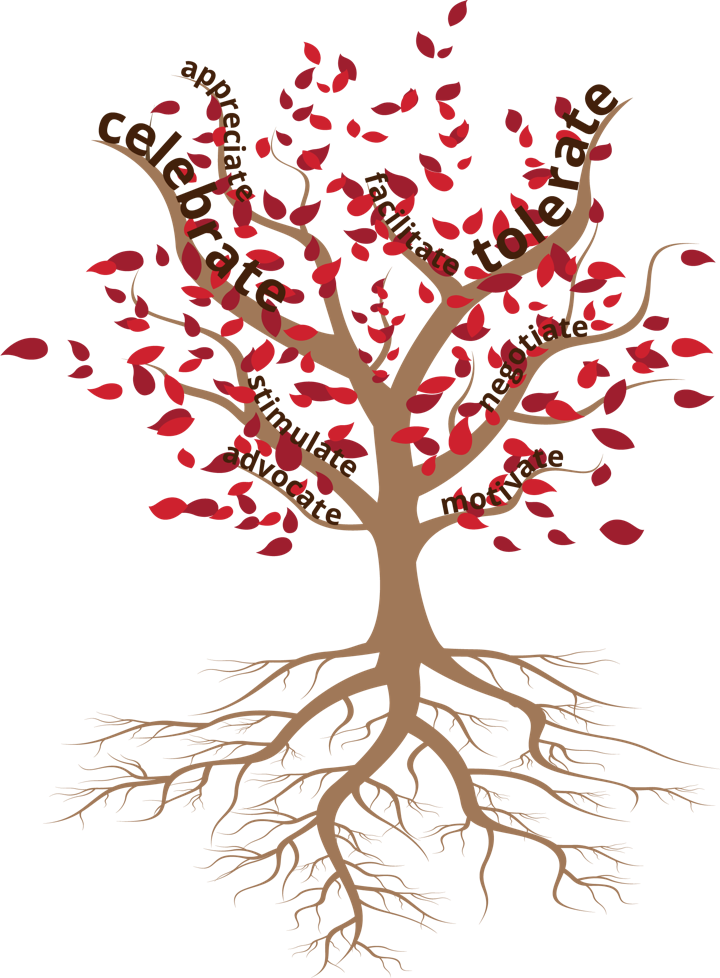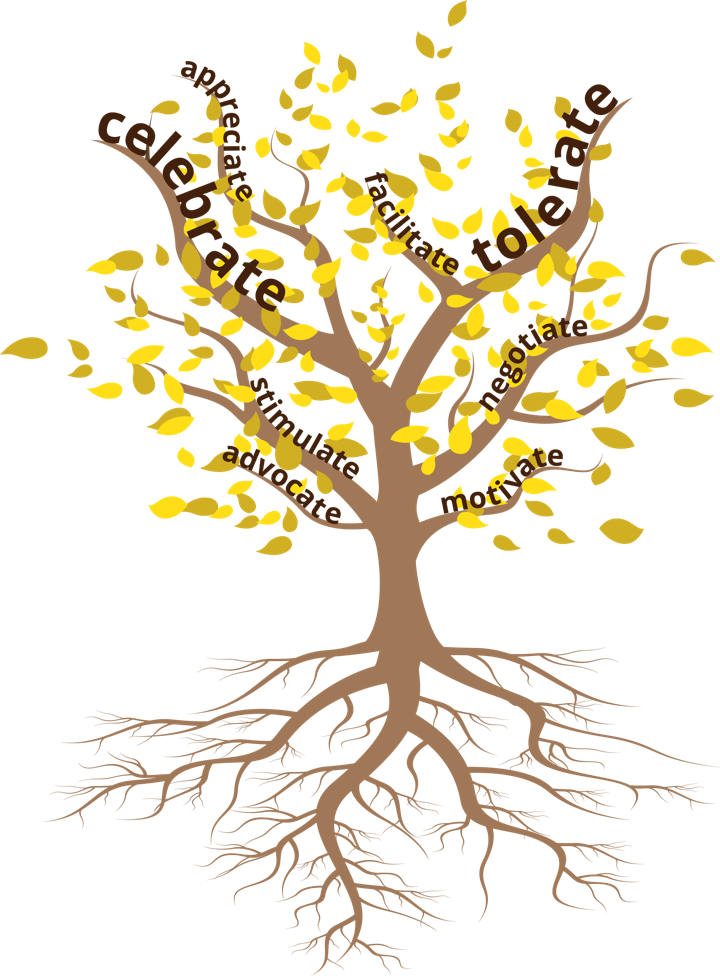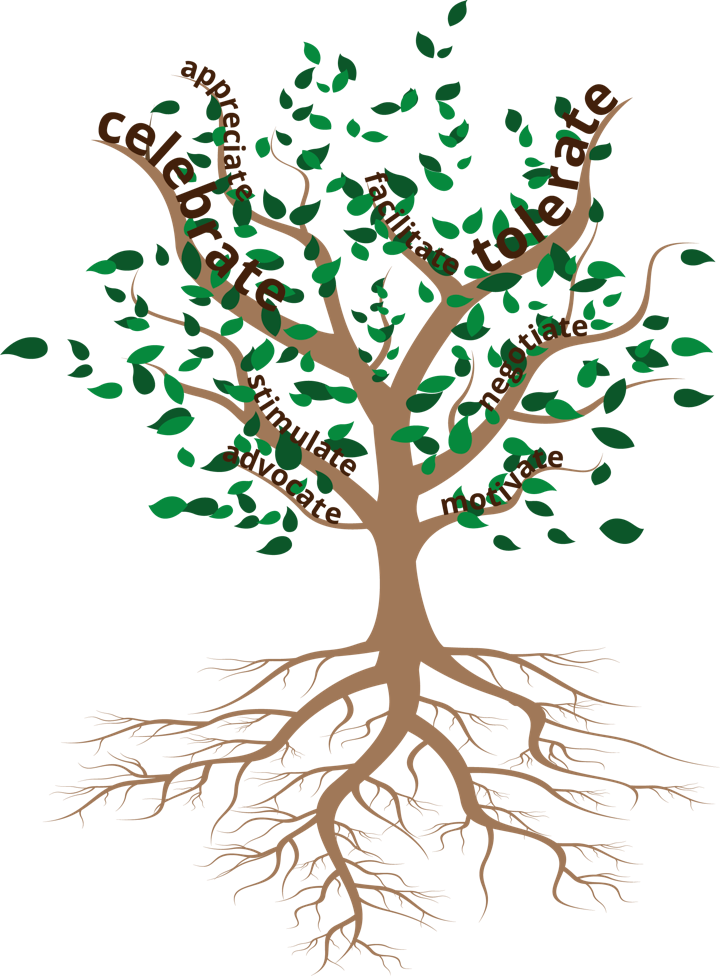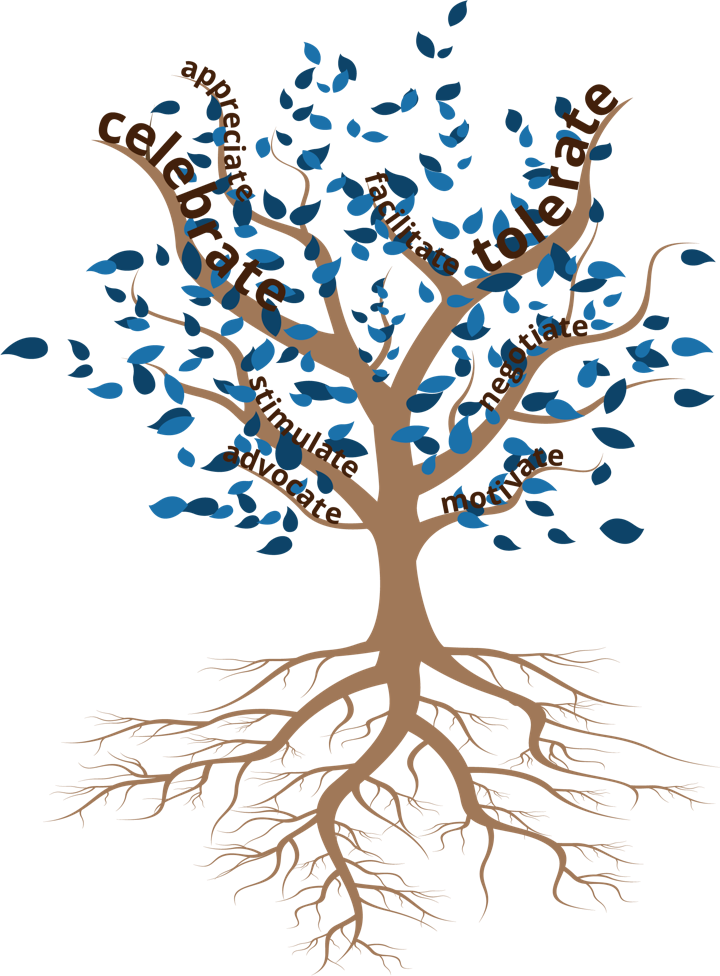“In Keirsey’s point of view, we believe that a person’s strengths and weaknesses are configured together as a part of the same system. That is, strengths and weaknesses are a part of the same tree. They are branches that stem from the same trunk, which share the same roots. “
Loving unconditionally is about total acceptance of the other. It means accepting the good, the bad, the lovely, and the ugly. And let’s face it, that’s hard to do! Whether it’s a significant other, a parent, child, friend, colleague, or client, loving (or even liking) another human being can be a challenge after the initial honeymoon phase where everything feels amazing. We would say that loving another entails a close look at the person for who they are. It means “celebrating” and “tolerating” the other. We would say that we are taught to celebrate the awesome aspects about an individual (usually called their strengths), and for those things which are seen as weaknesses, we often punish, try to change, or reject. We celebrate their strengths, and we ask them to change their weaknesses.
In Keirsey’s point of view, we believe that a person’s strengths and weaknesses are configured together as a part of the same system. That is, strengths and weaknesses are a part of the same tree. They are branches that stem from the same trunk, which share the same roots. Becoming irritated with a person’s weaknesses, and asking a person to get rid of their weaknesses is what is often mandated. However, our research reveals that an individual is configured in such a way where asking them to change their weaknesses can be like putting poison on the weak branch or cutting off those branches, and nurturing and preserving only the strong branches.
We would argue that this approach could actually be detrimental to the whole tree. We would say that if you want to help a person be all that they can be, that you have to embrace the whole tree, and that helping them grow into the full tree that they are meant to be entails that you celebrate strengths and tolerate their weaknesses.
And in doing so, you may find that those weaknesses become endearing because you understand that those weaknesses are tied to the same roots, which make that person awesome. In this article, we unpack what it is like to “love” people of different temperaments. Specifically, we look at what you need to celebrate and what you need to tolerate if the whole tree (the relationship) is going to thrive.
The Artisan Tree
At their roots, Artisans seek to be audacious, adaptable, and display artistic action. This means that they are daring, make adjustments on the fly, and carry things off with style. This leads to strengths that generally make Artisans courageous, flexible, and charismatic. These same roots can also lead to weaknesses which can make them overbearing, non-committal, and ostentatious.
They are celebrated for being courageous, flexible, and charismatic, but they are viewed negatively for being overbearing, non-committal, and ostentatious. And we might think that if we zone in on their weaknesses long and hard enough, that we could eliminate them; that if we reject those weaknesses, and get them to work on them, that we are helping to build up that person. Rather than focusing on their weaknesses, which can be deflating, and can ultimately impact the whole tree—(all of the branches, and the trunk and the roots are effected, making the whole tree suffer); what we would suggest instead is that you maximally celebrate their strengths, giving momentum to their lives.
We would say that if you want them to thrive, that you need to celebrate them for being courageous, flexible, and charismatic and you may have to tolerate the times when they are overbearing, non-committal, and ostentatious because it’s all part of the same tree. You have to love the whole person and not just their lovely parts.

The Guardian Tree
At their roots, Guardians seek to be reliable, of service, and respectable. This means that they are highly dependable, carry their fair share, and do what is honorable. This leads to strengths that generally make Guardians responsible, accountable, and dutiful. These same roots can also lead to weaknesses, which can make them critical, judgmental, and strict.
They are celebrated for being responsible, accountable, and dutiful, but they are viewed negatively for being critical, judgmental, and strict. And we might think that if we zone in on their weaknesses long and hard enough, that we could eliminate them; that if we reject those weaknesses, and get them to work on them, that we are helping to build up that person. Rather than focusing on their weaknesses, which can be deflating, and can ultimately impact the whole tree—(all of the branches, and the trunk and the roots are effected, making the whole tree suffer); what we would suggest instead is that you maximally celebrate their strengths, giving momentum to their lives.
We would say that if you want them to thrive, that you need to celebrate them for being responsible, accountable, and dutiful and you may have to tolerate the times when they are critical, judgmental, and strict because it’s all part of the same tree. You have to love the whole person and not just their lovely parts.

The Idealist Tree
At their roots, Idealists seek to be authentic, benevolent, and empathetic. This means that they are genuine, kind, and understanding. This leads to strengths that generally make Idealists lovable, warm, and compassionate. Now these same roots can also lead to weaknesses, which can make them overly sensitive, clingy, and highly emotional.
They are celebrated for being lovable, warm, and compassionate, but they are viewed negatively for being overly sensitive, clingy, and highly emotional. And we might think that if we zone in on their weaknesses long and hard enough, that we could eliminate them; that if we reject those weaknesses, and get them to work on them, that we are helping to build up that person. Rather than focusing on their weaknesses, which can be deflating, and can ultimately impact the whole tree—(all of the branches, and the trunk and the roots are effected, making the whole tree suffer); what we would suggest instead is that you maximally celebrate their strengths, giving momentum to their lives.
We would say that if you want them to thrive, that you need to celebrate them for being lovable, warm, and compassionate and you may have to tolerate the times when they are overly sensitive, clingy, and highly emotional because it’s all part of the same tree. You have to love the whole person and not just their lovely parts.

The Rational Tree
At their roots, Rationals seek to be ingenious, autonomous, and display willpower. This means that they are intellectual, self-defined, and resilient. This leads to strengths that generally make Rationals very intelligent, capable, and persistent. Now these same roots can also lead to weaknesses, which can make them arrogant, aloof, and driving.
They are celebrated for being intelligent, capable, and persistent, but they are viewed negatively for being arrogant, aloof, and driving. And we might think that if we zone in on their weaknesses long and hard enough, that we could eliminate them; that if we reject those weaknesses, and get them to work on them, that we are helping to build up that person. Rather than focusing on their weaknesses, which can be deflating, and can ultimately impact the whole tree—(all of the branches, and the trunk and the roots are effected, making the whole tree suffer); what we would suggest instead is that you maximally celebrate their strengths, giving momentum to their lives.
We would say that if you want them to thrive, that you need to celebrate them for being intelligent, capable, and persistent and you may have to tolerate the times when they are arrogant, aloof, and driving because it’s all part of the same tree. You have to love the whole person and not just their lovely parts.



